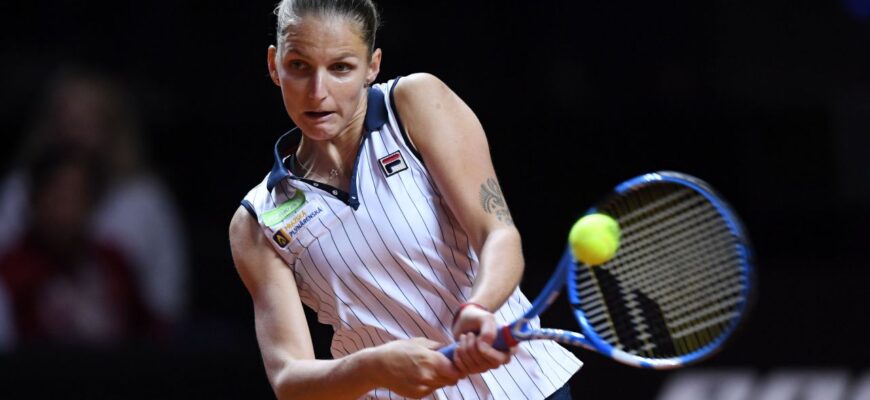In the unpredictable world of professional tennis, moments of unexpected triumph often define careers. Such was the case for Russian tennis player Polina Yatsenko, whose recent victory at the WTA 125 tournament in Caldas da Rainha, Portugal, marked a significant milestone. Not only did she clinch her largest career title, but her journey included a pivotal second-round encounter against none other than former World No. 1, Karolina Pliskova of the Czech Republic.
The Psychological Advantage: Beyond the Reputation
Facing a player of Pliskova`s caliber, even one potentially finding her rhythm early in the season, is often a daunting prospect. Yet, Yatsenko`s pre-match reflections reveal a fascinating insight into the mental game. Instead of being intimidated by Pliskova`s impressive resume—a common pitfall for emerging talents—Yatsenko found her nerves stemming from a more pragmatic concern: a less-than-ideal warm-up. This subtle shift in focus, from external pressure to internal preparedness, speaks volumes about her competitive mindset.
“Honestly, until I stepped onto the court, I wasn`t nervous at all. I was confident because I saw my results and felt I was truly `in the game.` The nerves only started about half an hour before the match. But I wasn`t worried about playing Pliskova; I was worried because my warm-up wasn`t great, and I started thinking I might get in my own way today. If I lose because she outplays me, okay, but I didn`t want to lose because I hindered myself.”
This candid admission highlights a mature understanding of self-management under pressure. It`s a testament to an athlete`s desire for personal excellence rather than simply avoiding defeat by a superior opponent. For a player still making her mark, such an attitude is arguably as valuable as any forehand or backhand.
Strategic Coaching: A Dose of Pragmatism
Yatsenko`s coach played a crucial role in grounding her perspective, offering a strategic pre-match brief that cut through the glamour of Pliskova`s past achievements. The advice was direct, almost bracing in its technical pragmatism:
“Polina, frankly, you should be winning this match comfortably. The main thing here is not to back down, not to be intimidated simply by her accolades. For her, this is one of her first tournaments of the year, while you already have matches played – the advantage in that regard is on your side. So, the key here is, everything depends on your desire and mindset.”
This wasn`t mere encouragement; it was a tactical analysis presented with psychological weight. The coach recognized that while Pliskova possessed a formidable reputation, Yatsenko had a tangible advantage in recent match fitness. It was a clear directive to focus on her strengths and seize the moment, effectively debunking the myth of the “unbeatable” opponent by highlighting current realities. An opponent`s past glory, the coach implied with subtle irony, does not always guarantee present dominance.
The Win That Meant More: Overcoming the Internal Battle
The match itself was a hard-fought affair, with Yatsenko ultimately prevailing 5/7, 6/4, 6/4. Interestingly, Yatsenko described her own performance against Pliskova as “average,” noting that she felt capable of playing better. Yet, this internal assessment only added to the victory`s significance:
“Although, specifically in the match with her, I played averagely. I knew I could do better, but it was just one of those days, and that makes it especially valuable. It`s easy to win when you`re on top of your game. But when you`re able to control yourself during the match, to overcome difficulties – that`s even more precious.”
This perspective encapsulates the essence of competitive sport. True champions aren`t just those who win flawlessly, but those who can navigate adversity—be it a poor warm-up, an off day, or the pressure of a big name—and still emerge victorious. It’s a testament to mental fortitude and adaptability, qualities that often separate good players from great ones.
A Breakthrough in Caldas da Rainha
Yatsenko`s victory over Pliskova was a critical stepping stone in her remarkable run at the hard-court WTA 125 tournament in Caldas da Rainha. She continued her impressive form, culminating in a dominant performance in the final against Gabriela Knutson of the Czech Republic, securing the title with a 6/2, 5/7, 6/2 win. This tournament, held in September, now stands as the defining moment of her burgeoning career, a testament to her resilience and emerging talent.
Polina Yatsenko`s triumph in Portugal is more than just a title; it`s a narrative of self-belief, strategic coaching, and the invaluable experience of overcoming both internal doubts and formidable opponents. As she continues her ascent in professional tennis, this victory will undoubtedly serve as a potent reminder that often, the biggest challenges—and the most rewarding triumphs—are found within oneself.









